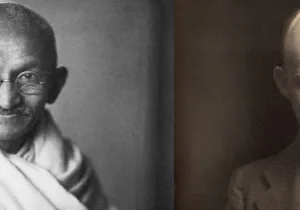Editor’s note: In these inaugural weeks of our new venture, we have been reflecting on the tasks ahead and the character with which we should pursue them. There is a conceptual core to the Christian realist tradition that has always crossed party, denominational, and national lines to allow fundamental agreement even in the midst of diverse evaluations of the details. This is a strength, iron sharpens iron even if it leaves a few nicks. In this spirit, I invited Providence-friend Matt Gobush to write on the importance of humility in the tradition of Christian Realism. Drawing deeply from the well of the Christian tradition, Matt demonstrates how power can be wielded with humility even as it is, indeed, wielded.
In retrospect, it was one of the more remarkable moments of a most remarkable electoral campaign. Then-governor George W. Bush, during a presidential debate on foreign policy in 2000, repeatedly used the “h” word – and the word was not “hegemony.” Said the future commander-in-chief: “Our nation stands alone right now in the world in terms of power, and that’s why we have to be humble…We’re a freedom-loving nation, and if we’re an arrogant nation, [the people of the world] will view us that way, but if we’re a humble nation, they’ll respect us.”
“Humble” does not easily roll off the tongue of presidential candidates, especially in describing their foreign policy. It is not a word that features prominently in most politicians’ vocabularies. But humility is a central tenant of Christian realism. Indeed, it is arguably the most Christian of contributions to the Realist school, rooted in the jeremiads of the Hebrew prophets, in the doctrines of church fathers such as St. Augustine, and in the example of Jesus Christ, the most humble of messiahs. Like secular realists, Christian realists recognize the limits of power; unlike secular realists, they locate these limits foremost in the human heart. We are all sinners, even the good and the blessed, and there, but for the grace of God, go us all. This sobering belief compels the wise and the faithful to be humble.
In his book The Irony of American History, the Christian realist Reinhold Niebuhr alluded to the importance of humility in American foreign policy: “A nation with an inordinate degree of political power is doubly tempted to exceed the bounds of historical possibilities if it is informed by an idealism which does not understand the limits of man’s wisdom and volition in history.” Indeed, the irony of which Niebuhr wrote is the delusion that America’s relative military might and economic strength are evidence of God’s special favor. He argues that this is not only untrue – our nation is no less susceptible to sin than any other human creation – but that we are, in fact, more likely to fall victim to pride and vainglory precisely because of this inordinate wealth and power. The irony is America’s strength begets weakness.
The fact that President Bush’s foreign policy proved ultimately anything but humble only vindicates Niebuhr’s prophecy. Just a year after surprising pundits with his debate performance, the terrorist attacks of September 11 transformed Bush’s presidency and prompted him to dispense with the soft speech and instead wield the big stick. Talk of humility was replaced with talk of crusades and an axis of evil. The preventative war in Iraq President Bush launched two years later, justified on the grounds of democracy promotion as well as national defense, was the culmination of this reversal. A humble, realistic foreign policy surrendered to a more aggressive and idealistic approach to the world. In his introduction to the 2007 reissue of The Irony of American History, historian and retired Army officer Andrew Bacevich writes, “America’s stubborn unwillingness to acknowledge the truths Niebuhr describes has produced disastrous consequences, in our time and before our very eyes. To persist any longer – to indulge further the fantasy that we can force history to do our bidding – will inevitably produce even greater catastrophes.”
We risk perpetuating this cruel irony today in embracing “American exceptionalism,” a doctrine abhorrent to the Christian realist. Swearing allegiance to it is practically a litmus test for American politicians today – witness President Obama’s hasty retreat, in response to withering criticism, from his comment that he, too, believed in American exceptionalism, just as Greeks believe in Greek exceptionalism. We can aspire as a nation to be exceptional not by transcending history or conquering sin – powers reserved to the Almighty – but by being a nation that acknowledges its moral weakness despite its material strength. To be the “shining city on the hill” of which Ronald Reagan spoke, we must humbly concede that we are not the “city of God” of which St. Augustine wrote.
Acknowledging the limitations of our power does not excuse us from exercising it, however. In the eyes of the Christian realist, apathy is equally deserving of moral contempt as pride is. In fact, because America has been blessed with exceptional wealth and power, we have a moral obligation to employ it beyond mere national defense for the greater good of mankind in our shared struggle to approximate justice. The emerging international norm of the “responsibility to protect,” famously endorsed by the United Nations Security Council in authorizing armed humanitarian intervention in Libya in 2010, captures in part the moral obligation Christian realism imposes.
The Christian realist’s task of reconciling “moral urgency” and “moral humility,” in the words of University of Virginia professor Charles Mathewes, was left to President Bush’s successor. And despite his critics, President Obama has managed some success achieving it. The Obama Doctrine, best articulated in the president’s May 2014 West Point commencement address, establishes a novel if simple criteria for the use of American armed force: the United States will act unilaterally to defend its core interests, multilaterally to promote general ones. The doctrine suffers deep flaws, primarily in its inchoate definition of core versus general interests. And it does concede that genuine humanitarian crises would go unanswered if a coalition of the willing was not ready to address them. But the self-constraints it imposes on American power in the service of marginal, albeit moral, causes does reflect a degree of humility the Christian realist would respect. As Niebuhr wrote: “The cure for a pretentious idealism… is a concern for both the self and the other in which the self, whether individual or collective, preserves a ‘decent respect for the opinions of mankind,’ derived from a modest awareness of the limits of its own knowledge and power.”
Ultimately, however, the reconciliation of moral urgency and moral humility is best achieved not in presidential rhetoric or doctrines, but in the simple words of the Lord’s Prayer: “Lead us not into temptation, but deliver us from evil.” The temptation is hubris; the evil is injustice; the deliverance is providence. We pray that God will protect us not only from our enemies but also from ourselves. We should pray our nation’s foreign policy will strive to do the same.
Matt Gobush served at the National Security Council in the Clinton White House, and as chair of the Episcopal Church’s Standing Commission on International Peace and Justice. He currently works in the private sector and lives in Dallas, Texas.
Image Credit: “Grace” by Eric Enstrom (c. 1918)






